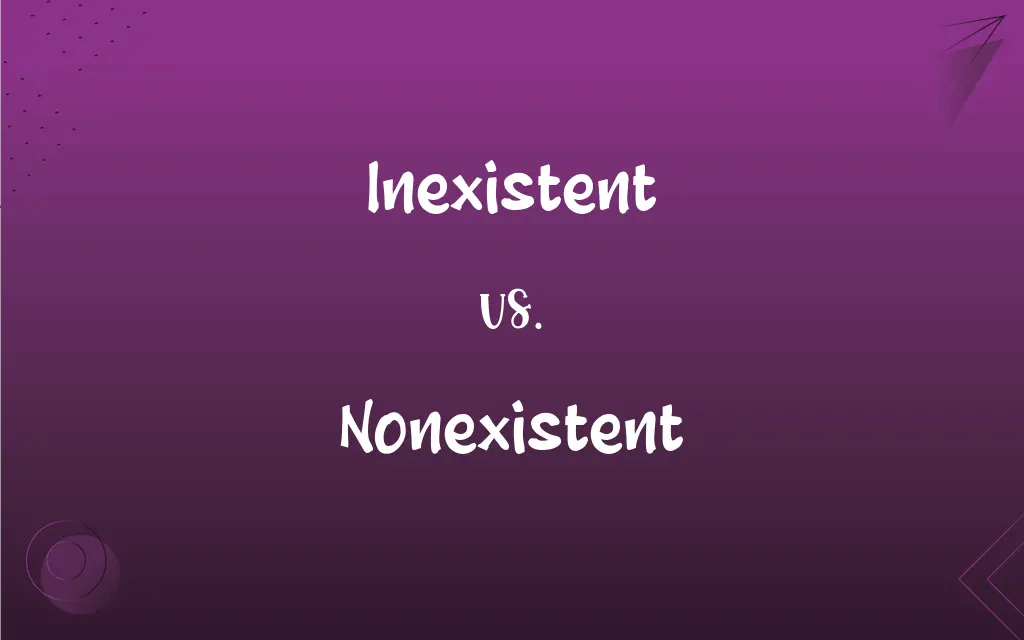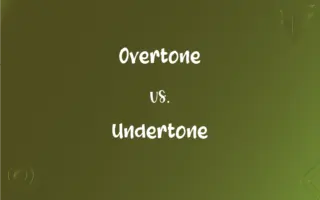Inexistent vs. Nonexistent: What's the Difference?
By Harlon Moss & Janet White || Updated on May 24, 2024
Inexistent means not existing or not being in a specified place or state. Nonexistent refers to something that does not exist or is completely absent.

Key Differences
Inexistent is an uncommon term that refers to something not existing or not being present in a specified place or state. It is more likely to be found in philosophical or literary contexts. Nonexistent, on the other hand, is a more commonly used term that describes something that does not exist at all. It is used in everyday language to denote the complete absence of something.
Inexistent is less frequently used in modern English and might be found in more formal or archaic texts. It suggests a state of not being present in a particular context or condition. Nonexistent is widely recognized and used to describe things that are completely absent or do not exist in any form.
From a grammatical perspective, both terms function as adjectives. However, nonexistent is much more versatile and widely accepted in both spoken and written English. Nonexistent can modify a wide range of nouns to indicate the total absence of something, while inexistent is rarely used and might be more specific to certain contexts.
In terms of usage, nonexistent is preferred in everyday conversations and writing to express the absence of entities, conditions, or objects. Inexistent might be used for stylistic reasons in literary works or philosophical discussions.
Comparison Chart
Definition
Not existing or not being in a specified place/state
Completely absent or not existing at all
ADVERTISEMENT
Usage Frequency
Rarely used, more formal or archaic
Commonly used in everyday language
Context
Philosophical or literary contexts
General use in everyday contexts
Grammatical Role
Adjective
Adjective
Versatility
Limited application
Broad application
Inexistent and Nonexistent Definitions
Inexistent
Not having physical presence or reality.
His fears were based on inexistent threats.
ADVERTISEMENT
Nonexistent
Not existing; completely absent.
The service at the restaurant was practically nonexistent.
Inexistent
Rarely used term for not being present.
In the dim light, the path seemed almost inexistent.
Nonexistent
Completely lacking or not available.
During the drought, water supplies were nonexistent.
Inexistent
Not existing or being in a specified place or state.
The rumored treasure turned out to be inexistent.
Nonexistent
Utterly without existence.
The company found that customer support for the product was nonexistent.
Inexistent
Absent or lacking in a particular context.
In that remote area, modern amenities were virtually inexistent.
Nonexistent
Not present in any form.
Evidence of the mythical creature is nonexistent.
Inexistent
Philosophical term for something that does not exist.
The concept of an inexistent entity was discussed in the lecture.
Nonexistent
The condition of not existing.
Inexistent
Having no existence; nonexistent.
Nonexistent
Something that does not exist.
Inexistent
Nonexistent.
Nonexistent
Not existent or existing; not real.
"Hrunk" is a nonexistent word.
His social skills are nonexistent: he chewed with his mouth open all through dinner.
Inexistent
Not having being; not existing.
Nonexistent
Not present or occurring.
Inexistent
Inherent; innate; indwelling.
Nonexistent
Something that does not exist.
Nonexistent
Not having existence.
Nonexistent
Not having existence or being or actuality;
Chimeras are nonexistent
Nonexistent
Not existing;
Innovation has been sadly lacking
Character development is missing from the book
Nonexistent
Having no physical or actual presence.
The proposed solution was based on nonexistent data.
FAQs
Is nonexistent commonly used?
Yes, nonexistent is commonly used in everyday language.
What does inexistent mean?
Inexistent means not existing or not being in a specified place or state.
Can inexistent describe something completely absent?
Yes, inexistent can describe something not being present, but it is less commonly used.
What contexts use nonexistent?
Nonexistent is used in general, everyday contexts to describe the absence of something.
What does nonexistent mean?
Nonexistent refers to something that does not exist or is completely absent.
Is inexistent commonly used?
No, inexistent is rarely used and is more formal or archaic.
What is an example of inexistent in a sentence?
"The rumored treasure turned out to be inexistent."
Is inexistent considered archaic?
Yes, inexistent is considered somewhat archaic and formal.
Is inexistent more formal than nonexistent?
Yes, inexistent is more formal and less commonly used than nonexistent.
Can nonexistent describe something completely absent?
Yes, nonexistent specifically means something is completely absent or does not exist.
What contexts use inexistent?
Inexistent is often used in philosophical or literary contexts.
Is nonexistent widely recognized?
Yes, nonexistent is widely recognized and used in modern English.
What is an example of nonexistent in a sentence?
"The service at the restaurant was practically nonexistent."
Can inexistent be used in everyday conversation?
While it can be used, inexistent is less likely to be understood in everyday conversation compared to nonexistent.
Are there contexts where inexistent is more appropriate?
Inexistent might be more appropriate in formal, literary, or philosophical contexts.
What is the grammatical role of nonexistent?
Nonexistent functions as an adjective.
Is nonexistent preferred in modern usage?
Yes, nonexistent is preferred and more commonly used in modern English.
Can inexistent and nonexistent be used interchangeably?
Generally, they can convey similar meanings, but nonexistent is more widely accepted and understood.
Which term is more versatile?
Nonexistent is more versatile and broadly applicable.
What is the grammatical role of inexistent?
Inexistent functions as an adjective.
About Author
Written by
Harlon MossHarlon is a seasoned quality moderator and accomplished content writer for Difference Wiki. An alumnus of the prestigious University of California, he earned his degree in Computer Science. Leveraging his academic background, Harlon brings a meticulous and informed perspective to his work, ensuring content accuracy and excellence.
Co-written by
Janet WhiteJanet White has been an esteemed writer and blogger for Difference Wiki. Holding a Master's degree in Science and Medical Journalism from the prestigious Boston University, she has consistently demonstrated her expertise and passion for her field. When she's not immersed in her work, Janet relishes her time exercising, delving into a good book, and cherishing moments with friends and family.
































































